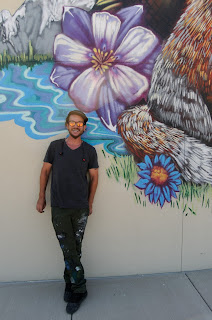Is Pueblo Sending Out Smoke Signals ?
Is Pueblo Sending Out Smoke Signals ?
 |
Ironic billboard located next to Pueblo Rescue Mission for the homeless. Located on 4th St. Pueblo, Co. |
Since the legalization of recreational cannabis in Colorado,many shifts in society are beginning to happen and people are starting to see those shifts here in Pueblo, Colorado. It has been very difficult for citizens to know what shifts in society are due to the legalization and which are not. In 2014, the people of Pueblo voted on towards amendment 64, making the sales of recreational cannabis legal on a state level. With change on the front-line and marijuana prohibition looking more and more like a thing of the past it important for research and studies to begin in order to solve problems and dismiss the lies and misinformation.
 |
 |
 |
| A cannabis dispensary in Pueblo off 4th St. |
Burnes says that homelessness comes about from economic crisis; loss of a job, high housing costs, exorbitant utility rates and a relationship or family break up, in that order. He has stated also that it is important to know that Colorado is a popular place to live. The mountains are beautiful and some fall in love at first sight of them. There is hiking, camping, fishing, river-rafting, the list goes on. Not to mention Pueblo specifically has amazing weather with 258 sunny days on average in Pueblo County, Many out of staters come to visit and admittedly fall in love Colorado.
Yes, recreational cannabis is creating jobs, but to obtain your MED Badge needed for state record, to work in the industry, one has to be a resident of Colorado for at least one year. Also there are many families that are moving here to treat a family member or be treated themselves medically with cannabis. These groups go by many names, "cannabis refugees", being one of them. Cannabis might have a tie like these, but it is such a small percentage when it comes to the issue of homelessness.
 |
| Colorado is a popular place to live, the mountains are easy to love! |
The economy engine is revved up in Colorado and it is not unusual to get people from out of state moving here for that reason alone. According to Burnes' research, the people coming out of state are not the reason for the spike in homelessness. With the influx of new residents, an estimated 10,000 a month, the beauty of the state and the plentiful jobs are drawing more in, far more so than legalized cannabis.
Burnes claimed while in Pueblo, that there is "anecdotal reports", or not necessarily true or reliable but more based on a personal account rather than research, by some service providers that draw a literal connection between the legalization of cannabis and homelessness. "The stereo types of, 'everyone who's homeless is a stoner,'" Burnes said, "we know that isn't true. But the myth about cannabis tends to reinforce that." It is common for statistics to show substance abuse as a part in homelessness, but according to Burnes it is "relatively low on the list". He added, "One of the things we know is that recreational cannabis is pretty expensive. It's much cheaper to get prescription drugs or illegal drugs than it is to get cannabis. So, substance abuse includes alcohol and drugs, but cannabis is a relatively small portion of this, with opiates playing a much more prominent, and growing role."
 |
| Posade shut down on 225 Colorado Blvd in Pueblo. |
Pueblo's Posada, is a non-profit organization support service. Posada's mission is to provide supportive services and housing to help individual and families in Pueblo to become self-supporting members of the community. In a recent meeting of Pro-Pueblo (a self-claimed group of concerned citizens) that sets out to protect the community, voiced their concerns publicly about the impact of cannabis and homelessness. Most of their concerns, as of late, tie in with legalization and the new problems they are seeing. Ann Stattleman, Executive Director of Posada, and active Pro Pueblo member, has been outspoken on the effects of legalization and growing homeless. She stated in a meeting at Pueblo Rawlings library meeting, that" more violent people have been coming in, assaulting my staff and resulting of needing security. Hostel people are swarming in to Posada." It is undeniable that this is a huge issue, but what is the correlation to cannabis? She told the Pueblo Cheiftain that her and her staff constantly see cars packed full of belongings and people self-confessing that they came here for the marijuana industry. Stattleman added that people confide in her staff admitting that they came to Colorado to find a job in the industry.
 |
| Pueblos Posada was shut down and is for sale. |
 |
| Professor McGettigan of CSU-Pueblo is part of a study on society and cannabis. |
Luckily sociologists in Pueblo and CSU-Pueblos professionals, are already out in the field studying social changes due to legalization. Timothy McGettigan, a professor at CSU-Pueblo (PHD in Sociology), is part of the local study that will focus on social issues like this one. McGettigan is currently studying demography, poverty and homelessness. "It's a very broad, impact study and it is expected to be delivered to the commissioners by December", McGettigan said. He is part of the newly founded Institute of Cannabis Research (ICR) at CSU-Pueblo. With CSU-Pueblo being one of the first colleges "to generate new knowledge of cannabis and it derivatives through research and education that improves lives and contributes to sieve, medicine and society", (says campus President Lesley Di Mare) they are out conducting studies and have been for a little over a year.

When asked about the correlations between legalization and homelessness, McGettigan got very passionate. "We have a full on crisis in Pueblo County and it's been getting worse every year, know what it is? BLACK HILLS ENERGY! If there is a propagator of homelessness, they are.!" Currently Black Hills Energy applied for a rate increase of 50% up to 97% for Pueblo County.

"Black Hills Energy is forcing people into homelessness. They terrorize tons of people and force them out of their homes. Now let's compare this to cannabis!"
Last year Black Hills shut off energy to over 7,000 homes in the Pueblo area. "This isn't 7,000 individuals, its 7,000 families!" McGettigan urged". Other places outside of Pueblo have housing as their biggest cost, but in Pueblo (especially groups that makes $50,000 a year or less) utilities are the highest cost and we don't see the community outraged, like we do about cannabis." He continued, " These are the people that end up in the street and no one is talking to them, just talking ABOUT them! "
Through time we will see what society will bring and the shifts that take place. Change is inevitable and education and learning is key in promoting a better economy that is safe and effective. Educate yourself before making an assumption and talk to people, ask questions and if you are interested in social change, learn the facts and find solutions. Social shifts can be scary but it is exciting for Colorado to be on the front line. McGettigan thinks that good things are to come for Pueblo, and is excited to be part of such an important time in our history. Homelessness is an important issue and always will be, but focusing on the factual issues are needed for reform. As for now, homelessness is not on the rise due to the legalization of cannabis, despite popular belief in Colorado.




Comments
Post a Comment